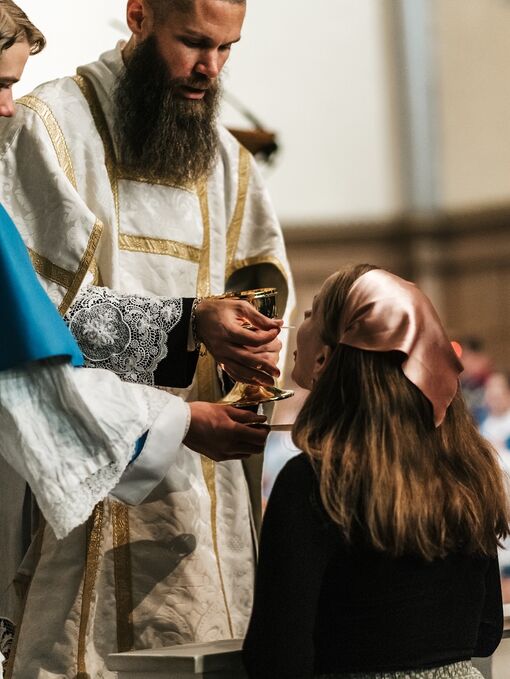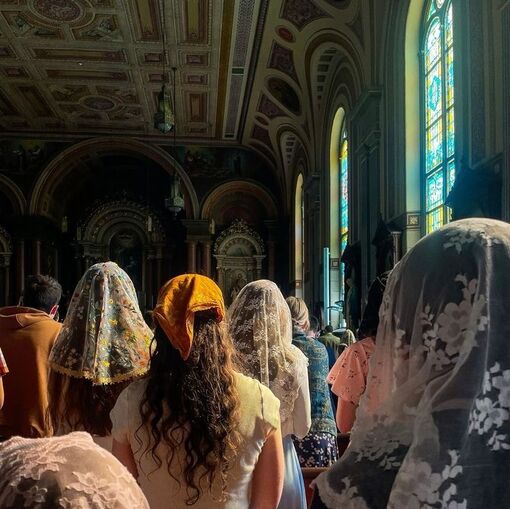
Annabel & José
February 15, 2025 • Pittsburgh, PA
Annabel & José
February 15, 2025 • Pittsburgh, PA
“Love binds people too, in Matrimony’s sacred bonds, where chaste lovers are met and friends cement their trust and friendship. How happy is mankind if the love that orders the stars above rules too in their hearts!” -Saint Severinus Boethius
General Information
Can I wear perfume or cologne?
The bride has a very strong perfume allergy, to the point that most standard laundry detergents will cause a reaction. We won’t ask you to change your detergent, but we do ask that you refrain from wearing perfume or cologne on our wedding day.
What is the dress code?
We ask that, out of respect for the sacred atmosphere, the bride, and the groom, that all guests wear modest, semi-formal attire. Refrain from wearing white or similar light colors.
For men, button down shirts and dress pants/khakis are a good example of what to wear.
For women, a dress or skirt that goes at or below the knees and a top that isn’t low-cut or sleeveless is perfect!
Should I buy a gift from the registry?
Monetary gifts and items from the registry are immensely appreciated! Our registry has been carefully put together to include high quality, low-tox items to start our new home together.

The Mass
What is the “Latin Mass”?
The Latin Mass, or Traditional Latin Mass, is a Roman Catholic liturgy celebrated in Latin, following the rites used before the reforms of the Second Vatican Council in the 1960s. It features a formal, solemn atmosphere with the priest facing the altar, and includes Gregorian chant and traditional prayers.
The Latin Mass was our first connection. It is very special to us, and we are so excited to share in this beautiful, ancient form of worship with you!
Does your wedding count for my Sunday obligation?
The short answer is no. All Catholics are required to attend Mass on Sundays. Attending a vigil Mass on Saturday night also counts, but the Mass must start at 4pm or later. Since our wedding ceremony and Mass will start at 2pm, it does not count for your Sunday Mass. What a blessing it will be for you to attend Holy Mass twice in one weekend! Deo Gratias!

Communion
What is Communion, who can receive it, and how is it distributed?
Communion, or the Eucharist, is a sacrament in Catholicism where believers receive the true body and blood of Jesus Christ, under the appearances of bread and wine. It is central to Catholic worship, commemorating the Last Supper and Our Lord’s sacrifice on Calvary.
To receive Communion, a Catholic must be in a state of grace (free from mortal sin), have fasted for at least one hour before receiving, and believe in the doctrine of transubstantiation (the bread and wine becoming the actual body and blood of Christ)
At the Latin Mass, Communion is distributed at the altar rail. The faithful kneel, and the priest places the consecrated host directly on the tongue of each communicant. Non-Catholics, or those not receiving Communion, may approach the altar rail with arms crossed over their chest to receive a blessing instead.
i have not gone to confession in a while. should i receive communion?
The Eucharist should not be received by anyone in a state of mortal sin. A mortal sin is committed when the thought or action meets three requirements: grave matter, full knowledge, and full consent. We kindly ask that if you are baptized Catholic and plan to receive communion at our wedding, that you go to confession sometime before, especially if you have any mortal sin on your conscience. Meet Our Lord in the sacrament of His mercy! Please
reach out to either José, Annabel, or a trusted Priest if you have any questions about this sacrament. We would love to walk with you through this!
I am not Catholic. Can I receive the Eucharist?
We love our non-Catholic family and friends and we are so happy to share in worship with you! Non-Catholics cannot receive Communion in a Catholic Church because it signifies full agreement with Catholic beliefs, especially the doctrine of transubstantiation (the bread and wine becoming the body and blood of Christ). We ask that out of respect for the Eucharist, you do not receive it unless you meet the requirements in the questions above. Non-Catholics can still participate in the Mass and receive a blessing instead of Communion. Please approach the altar rail, kneel, and cross your arms over your chest to receive a blessing.

Head Coverings
Why will the bridesmaids be wearing veils, too?
Women traditionally covered their heads in church as a sign of reverence, humility, and respect for God. This practice, rooted in early Christian customs and supported by biblical references such as 1 Corinthians 11:5-6, emphasized the distinction between genders and the importance of modesty and piety in worship settings.
Any female guest is encouraged to cover her hair! Wearing a veil, hat, or scarf is a simple and beautiful way to show reverence towards Jesus Christ, present in all tabernacles around the world.